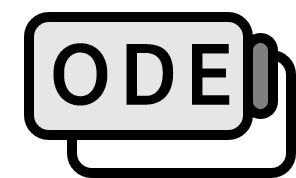Solution to the Exact Differential Equation
Solution
The solution to the given exact differential equation $M(x,y)+N(x,y)\dfrac{dy}{dx}=0$ is as follows.
Step 0.
Since the differential equation given is exact, an $\psi$ exists such that $\psi_{x}=M,\ \ \psi_{y}=N, \ \ \psi=c$.
Step 1.
Integrate $\psi_{x}$. Then, differentiate the obtained $\psi$ with respect to $y$ to find $h^\prime(y)$. The entire process including Step 1 can be done the opposite way with respect to $x$ and $y$ as well.
$$ \begin{align} && \psi &= \int \psi_{x} = \int M(x,y)dx + h(y) \label{eq1} \\ \implies && \psi_{y}&=\dfrac{\partial}{\partial y} \left( \int M(x,y)dx \right) +h^\prime(y)=N(x,y) \nonumber \\ \implies && h^\prime(y)&=N(x,y) - \dfrac{\partial}{\partial y} \left( \int M(x,y)dx \right) \nonumber \end{align} $$
Step 2.
Integrate the found $h^\prime(y)$ to obtain $h(y)$ and then substitute it into $\eqref{eq1}$.
$$ \begin{align*} && h(y)&=\int h^\prime(y) dy =\int N(x,y) dy - \int \left[ \dfrac{\partial}{\partial y} \left( \int M(x,y)dx \right) \right] dy \\ \implies && \psi (x,y)&= \int M(x,y)dx + \int N(x,y) dy - \int \left[ \dfrac{\partial}{\partial y} \left( \int M(x,y)dx \right) \right] dy \end{align*} $$
Step 3.
Finally, representing $\psi$ in an implicit form will be the solution to the differential equation.
$$ \int M(x,y)dx + \int N(x,y) dy - \int \left[ \dfrac{\partial}{\partial y} \left( \int M(x,y)dx \right) \right] dy=c $$
■
Examples
1
Solve the differential equation $(2x^3y+4xy)+(\frac{1}{2}x^4+2x^2+3y^2)y^\prime=0$.
$$ M(x,y)=2x^3y+4xy\quad N(x,y)=\frac{1}{2}x^4+2x^2+3y^2 $$
Then,
$$ M_{y}=2x^3+4x=N_{x} $$
which means the given differential equation is exact. Therefore,
$$ \psi_{x}=M,\quad \psi_{y}=N $$
an $\psi=c$ that satisfies it exists.
$$ \begin{align*} && \psi&=\int M dx = \int (2x^3y+4xy) dx = \frac{1}{2}x^4y+2x^2y+h(y) \\ \implies && \psi_{y}&=\frac{1}{2}x^4+2x^2+h^\prime (y)=N(x,y)=\frac{1}{2}x^4+2x^2+3y^2 \\ \implies && h^\prime (y)&=3y^2 \\ \implies && h(y)&=\int 3y^2 dy = y^3 \\ \implies && \psi& =\frac{1}{2}x^4y+2x^2y+h(y) = \frac{1}{2}x^4y+2x^2y+y^3 \end{align*} $$
Hence, the general solution is the implicit form of $\frac{1}{2}x^4y+2x^2y+y^3=c$.
■
2
Solve the differential equation $(3xy+y^2) + (x^2+xy)y^\prime =0$.
$$ M(x,y)=3xy+y^2,\ \ N(x,y)=x^2+xy $$
Then,
$$ M_{y}=3x+2y \ne 2x+y=N_{x} $$
which means the given differential equation is not exact. Therefore, the method of solving exact differential equations cannot be used. Let’s check if it really doesn’t work. Though it’s not an exact differential equation,
$$ \psi_{x}=M(x,y)=3xy+y^2,\quad \psi_{y}=N(x,y)=x^2+xy $$
Let’s assume that an $\psi$ that satisfies it exists. Following the method of solving exact differential equations,
$$ \begin{align*} && \psi& =\int \psi_{x} dx = \int 3xy+y^2 dx = \frac{3}{2}x^2y+xy^2+h(y) \\ && \psi_{y}&=\frac{3}{2}x^2 + 2xy+h^\prime (y)=N(x,y)=x^2+xy \\ \implies && h^\prime (y) &= -\frac{1}{2}x^2-xy \end{align*} $$
This result contradicts the fact that $h^\prime(y)$ is a function that depends only on $y$. Therefore, an $\psi (x,y)$ that satisfies the definition of an exact differential equation does not exist.
■
